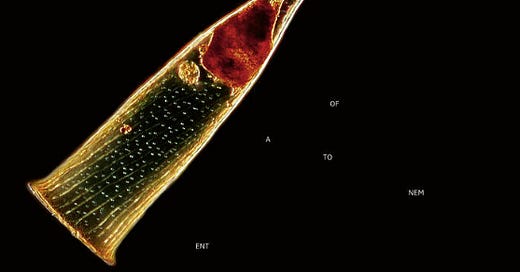Leprous are among a number of Progressive Metal acts which rose to prominence in the 2010s, including Haken, Soen, and Caligula’s Horse. This class of Prog artists have largely taken over as the dominant sector of the genre in the last several years as the old guard begins to age out or grow stale or, in the case of Opeth, do whatever the fuck Opeth is doing.1 With that said, I also need to acknowledge that Prog Metal might be the broadest singular genre out there — it’s definitely the broadest that I’m familiar with — and there is so much room, stylistically, for these different groupings within the genre.
Leprous stands out from the rest for a few reasons, but chief among them is vocalist Einar Solberg. Even the band’s detractors typically highlight Solberg as the notable difference between Leprous and other acts in this particular space. I’ve seen the equivalent of aggressive shrugging as some write off Solberg’s impact on the band’s sound as ‘just flipping to falsetto a lot’, which I find to be a bit of a cynical and oversimplified take.
Does Solberg spend a significant amount of each song in falsetto? Yes. Does he sometimes hit absurd notes? Absolutely. But framing it in such a limited scope ignores the fact that Rock and Metal have a history of reaching for high notes — because high notes equal high energy. They just tend to do so with full voice as much as possible.
It also ignores Solberg’s monstrous range2 and stylistic flexibility. I believe he is truly one of the best in the business right now.
But he isn’t alone. I know I just spent a solid minute (including the footnote) ranting about Solberg’s ability and his voice being a key component of the band’s sound, but Solberg has released a solo album, and its compositions, compared to those found on this or any other Leprous album, are lacking. Which, according to what the band has revealed of their composition process, is odd, as Solberg concocts the foundation of every song on his keyboard. But the adaptation of those ideas by the rest of the band, especially fellow founding member and guitarist Tor Oddmund Suhrke, creates rich, deep songs.
This process also creates interesting instrumental lines, as Suhrke notes in the interview you can read by clicking that last link, because a keyboard plays very differently from guitar or bass, so the riffs which result from their adaptation end up sounding very different from the sort of riffs that guitar players generally create. This also helps to explain why the band frequently leans into djenty guitar lines.
There’s a strong shift with Melodies of Atonement, though, potentially marking the beginning of a new era for the band.3 There was, as noted by Solberg in an interview with Louder Sound, a deliberate effort to make the album heavier than anything they’ve done in the last several years. While there are still a lot of lighter, atmospheric moments, there’s definitely more weight and aggression in Melodies, including a few brief moments of harsh vocals and screams, such as on “Like a Sunken Ship”.
Solberg also notes that the band has largely pared back or “removed” the symphonic elements that they’ve used a lot on previous albums “because [he’s] taking them further in [his] solo project”, and I suppose this is another way to differentiate Leprous from Solberg’s solo efforts going forward. But, as I indicated earlier, the compositions still have depth and even feel atmospheric at points — because, while the symphonic elements may be gone, they’ve been pretty effectively replaced by electronic elements, including plenty of synth.
The resultant blend sometimes sounds like some dark, Gothic EDM variant with crisp, catchy rhythms fueled by an overabundance of syncopation. There are a lot of interesting sounds and moments on the album.
That said, the first half is generally better than the second; “Faceless” feels drab and repetitive at a certain point; and “Self-Satisfied Lullaby” takes nearly two minutes to get going, and even then it’s a false start (it actually gets going at the four-and-a-half mark and hits a solid groove for the next minute or so). The crux of the issue with these two, in particular, is that they’re the two longest songs on the album, at just shy of six-and-a-half minutes each.
In the end, it feels like a stumble into this new Leprous. There’s a lot to like here, including a couple of really great tracks, but also several missteps. I was hoping for a little more from them, but I’m pretty pleased with most of it.
Rating: Teal Green
Please be aware that this statement is largely in jest and I still LOVE everything that this band has done in the last 15 years or so. But they’re definitely just doing whatever they/Akerfeldt want/s to do at this point in their career.
According to the folks at The Range Planet, a site which catalogues and records the ranges of vocalists based on released music, his full range is G2-C6; for those, like me, who aren’t inherently familiar with a piano keyboard or music theory in general, Ultimate Music Theory has a keyboard chart which overlays the typical vocalist ranges onto the graphic.
According to that, G2 is near the bottom of the typical bass range, and C6 is near the top of the typical soprano. Some people would kill to have a range that dynamic.
There is a consensus amongst fans that Leprous shifted around or after their 4th album, 2015’s The Congregation. The three albums which released between 2017 and 2021 are, sonically, very different from their first four albums.
Melodies of Atonement stands in stark contrast to 2021’s Aphelion, reaching backward towards a middle ground between these two eras.
That said, I did love 2021’s Aphelion; it scored a Purple from me and ranked 5th for the year.





